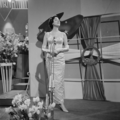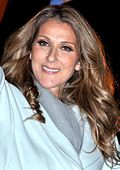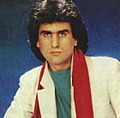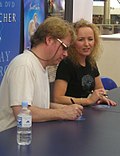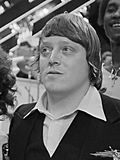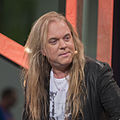Top Qs
Timeline
Chat
Perspective
List of Eurovision Song Contest winners
From Wikipedia, the free encyclopedia
Remove ads
72 songs written by 150 songwriters have won the Eurovision Song Contest, an international song competition organised annually by the European Broadcasting Union (EBU). The contest, which has been broadcast every year since its debut in 1956,[a] is one of the longest-running television programmes in the world. The contest's winner has been determined using numerous voting techniques throughout its history; centre to these have been the awarding of points by juries or televoters. The entry awarded the most points is declared the winner.[1] The first contest was not won on points, but by votes (two per country), and only the winner was announced.[2]
Left: Lys Assia, the first Eurovision winner (1956), and Dima Bilan, winner in 2008. Centre: Johnny Logan, the winning artist in 1980, winning artist and composer in 1987 and the winning composer in 1992. Right: Loreen, winner of the 2012 and 2023 editions, celebrating her first victory in Baku.
Left: Ralph Siegel, the winning songwriter in 1982 for Germany and composer of twenty-three other entries between 1974 and 2017. Centre: Rolf Løvland, the winning songwriter in 1985 and 1995 for Norway, with Fionnuala Sherry, winning performer in 1995. Right: Luísa Sobral, winning songwriter in 2017 for Portugal.
There have been 69 contests, with one winner each year except for the tied 1969 contest, which had four. Songs representing 27 countries have won the contest, with Switzerland winning the first contest in 1956. The countries with the highest number of wins are Ireland and Sweden with seven wins each. Two people have won more than once as a performer: Ireland's Johnny Logan, who performed "What's Another Year" in 1980 and "Hold Me Now" in 1987, and Sweden's Loreen, who performed "Euphoria" in 2012 and "Tattoo" in 2023. Logan is also one of seven songwriters to have written more than one winning entry ("Hold Me Now" and "Why Me?" performed by Linda Martin in 1992),[3] and is the only person to have three Eurovision victories to their credit, as either singer, songwriter or both. The other six songwriters with more than one winning entry to their credit are Willy van Hemert (Netherlands 1957 and 1959), Yves Dessca (Monaco 1971 and Luxembourg 1972), Rolf Løvland (Norway 1985 and 1995), Brendan Graham (Ireland 1994 and 1996), and Thomas G:son and Peter Boström (both for Sweden 2012 and 2023).
Relatively few winners of the Eurovision Song Contest have gone on to achieve major success in the music industry. The most notable winners who have gone on to become international stars are ABBA, who won for Sweden in 1974 with their song "Waterloo",[4] and Céline Dion, who won for Switzerland in 1988 with the song "Ne partez pas sans moi".[5] More recently, Duncan Laurence, who won for the Netherlands in 2019 with "Arcade", experienced worldwide streaming success with the song as a sleeper hit throughout 2020 and 2021, with it becoming the most streamed Eurovision entry on Spotify.[6] Måneskin, winners for Italy in 2021 with "Zitti e buoni", subsequently achieved worldwide popularity in the months following their victory.[7]
The performer and the songwriter(s) of the winning song only receive a medal or a trophy, while its participating broadcaster is invited to host the following year's contest. Since 2008, the performer has been awarded a handmade trophy of sandblasted glass in the shape of a 1950s microphone,[8] while the songwriter(s) and the broadcaster receive smaller versions of the trophy. Its original design was created by Kjell Engman of Kosta Boda, who specialises in glass art.[9] This trophy is notoriously fragile, and the support infamously broke on stage right after being received by Alexander Rybak, who won for Norway in 2009,[10] and by Nemo, who won for Switzerland in 2024.[11] The trophies given to Emmelie de Forest, who won for Denmark in 2013,[12] to Netta, who won for Israel in 2018,[13] and to JJ, who won for Austria in 2025,[14] also broke in the exact same spot after the event. Despite this, no redesigns have been made since.
Remove ads
Winners by year
Remove ads
Performers and songwriters with multiple wins
The following individuals have won the Eurovision Song Contest as a performer or songwriter more than once.
Remove ads
Observations
Summarize
Perspective
Eleven Eurovision winning songs (alongside three non-winners) were featured at the special concert Congratulations: 50 Years of the Eurovision Song Contest in 2005, in which "Waterloo" by ABBA was voted the most popular song of the contest's first fifty years.[88]
Ireland and Sweden have won seven times, more than any other country. Ireland also won the contest for three consecutive years (1992, 1993, and 1994), the only country to ever do so. Three countries have won twice in a row: Spain (1968 and 1969), Luxembourg (1972 and 1973) and Israel (1978 and 1979). Serbia is the only country to win with its debut entry (in 2007).[b] By contrast, Portugal holds the record for waiting the longest to achieve their first win, doing so in 2017; 53 years after their first appearance in the contest. Austria holds the record for longest wait in between wins, having won for the first time in 1966 and a second time in 2014. Under the voting system used between 1975 and 2015, the winner of the contest was decided by the final voting country on eleven occasions.[c]
Changes to the voting system, including a steady growth in the number of countries participating and voting, means that the points earned are not comparable across the decades. "Amar pelos dois" by Salvador Sobral holds the record of the highest number of points in the contest's history, earning 758 points in 2017. "Fairytale" by Alexander Rybak holds the largest margin of victory in absolute points, a 169-point cushion over second place in 2009. "Non ho l'età" by Gigliola Cinquetti holds the record for largest victory by percentage, scoring almost three times as many as second place (49 points compared with 17 by the runner-up) in the 1964 contest. The lowest winning score is the 18 points (of the 160 total votes cast by 16 countries) scored by each of the four winning countries in 1969.
Under the voting system used from 1975 until 2015, in which each country gives maximum points to its first place choice, "Euphoria" by Loreen won the 2012 contest with the most ever first place votes earned, receiving first place votes from 18 of 41 countries (excluding themselves). The 1976 winner, "Save Your Kisses for Me" by Brotherhood of Man, holds the record of the highest average score per participating country, with an average of 9.65 points received per country. The 2011 winner, "Running Scared" by Ell and Nikki, holds the lowest average score for a winning song under that system, receiving 5.14 points per country.
Around two-thirds of the winning songs were performed in the second half of the final. According to the official statistics, until 2019, only 34.3% of the winning songs were performed in the first half, including 3 of the 4 winners in 1969. The only song to win without being clearly in one half or the other was the Israeli entry "Hallelujah" by Milk and Honey in 1979, which was drawn 10th out of 19 songs. Between 2005 and 2013, all the winning songs were performed in the second half of the final's running order.[89]
The United Kingdom has finished second sixteen times at Eurovision (most recently in 2022), more than any other country. France has finished third and fourth eight times at Eurovision (most recently respectively in 1981 and in 2024), and Sweden has finished fifth nine times at Eurovision (most recently in 2019). The country with the most top three places that has never won the contest is Malta, having finished second in 2002 and 2005 and third in 1992 and 1998. Another island nation, Iceland, has also finished second twice, in 1999 and 2009. With Portugal achieving its first win in 2017, Malta now also holds the record for longest wait for a first win, having first entered the contest in 1971 (although Cyprus has more winless appearances, with 36 since debuting in 1981, due to Malta taking a break from 1976 through 1990). Spain holds the current record for longest drought by a winning country, having last won in 1969. They are followed by France (1977) and Belgium (1986).
There is no official runner-up for two of the contests – 1956 and 1969. In 1956 only the winner, Switzerland, was announced. In 1969, four songs shared first place by achieving the same number of points; fifth place was achieved by Switzerland, which is not considered an official runner-up, because of the draw for first place.
Discrepancies between the jury and televote
This section is missing information about the obviously much higher discrepancies of non-total winners. (May 2025) |
Since the reintroduction of the juries alongside televoting in 2009, the jury and the televote awarded the most points to the same entry on six occasions: in 2009, 2010, 2012, 2013, 2014 and 2017. Two winners have won without placing first in either area: Ukraine's "1944" by Jamala in 2016, who finished second in the jury vote behind Australia and second in the televote behind Russia, and the Netherlands' "Arcade" by Duncan Laurence in 2019, who placed third behind North Macedonia and Sweden in the jury vote, and second behind Norway in the televote.
Sweden won both the combined vote and jury vote in 2015 and 2023, represented by "Heroes" by Måns Zelmerlöw and "Tattoo" by Loreen, respectively. However, in the televote, Sweden came third behind Italy and Russia in 2015, and second behind Finland in 2023. Both Switzerland's "The Code" by Nemo in 2024 and Austria's "Wasted Love" by JJ in 2025 won the combined vote and jury vote, but in 2024 Switzerland placed fifth in the televote behind Croatia, Israel, Ukraine, and France. Meanwhile, in 2025 Austria placed fourth in the televote behind Israel, Estonia and Sweden.
Azerbaijan's "Running Scared" by Ell and Nikki in 2011, Israel's "Toy" by Netta in 2018, Italy's "Zitti e buoni" by Måneskin in 2021 and Ukraine's "Stefania" by Kalush Orchestra in 2022 all won both the combined vote and televote. However, in the jury vote, Azerbaijan came second behind Italy in 2011, Israel came third behind Austria and Sweden in 2018, Italy came fourth behind Switzerland, France and Malta in 2021, and Ukraine came fourth behind the United Kingdom, Sweden and Spain in 2022.[90]
Remove ads
Winners by country
Summarize
Perspective
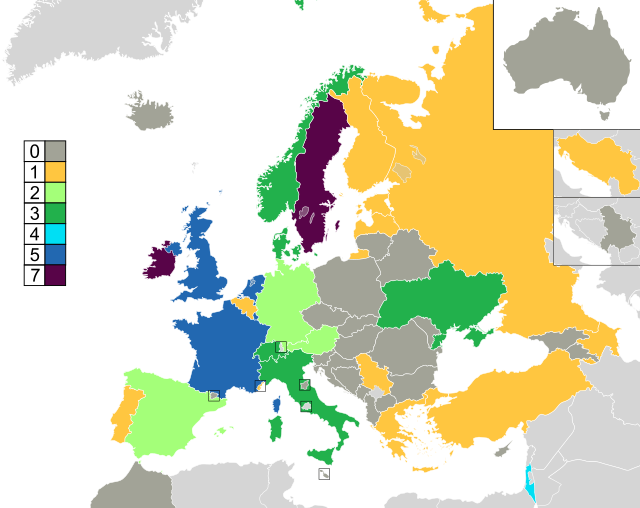
The first country to repeat win was the Netherlands, completed in 1959. France was the first country to win three times (completed in 1962), four times (completed in 1969), and five times (completed in 1977). Ireland was the first country to win six times (completed in 1994) and seven times (completed in 1996). The first country to win two consecutive contests was Spain, in 1968 and 1969. The first and to date only country to win three consecutive contests was Ireland, in 1992, 1993, and 1994.
† |
Inactive – countries whose broadcaster had participated in the past but did not compete in the most recent contest, and have not announced its participation in the upcoming contest |
◇ |
Ineligible – countries whose broadcaster are no longer part of the EBU and are therefore ineligible to participate |
‡ |
Former – countries which previously participated but no longer exist |
1969 is in italics to indicate the joint (four-way) win.
Remove ads
Gallery
Performers
- Corry Brokken, winner of the 1957 contest for the Netherlands.
- André Claveau, winner of the 1958 contest for France.
- Teddy Scholten, winner of the 1959 contest for the Netherlands.
- Jacqueline Boyer, winner of the 1960 contest for France.
- Jean-Claude Pascal, winner of the 1961 contest for Luxembourg.
- Isabelle Aubret, winner of the 1962 contest for France.
- Gigliola Cinquetti, winner of the 1964 contest for Italy.
- France Gall, winner of the 1965 contest for Luxembourg.
- Udo Jürgens, winner of the 1966 contest for Austria.
- Sandie Shaw, winner of the 1967 contest for the United Kingdom.
- Lenny Kuhr, one of the four winners of the 1969 contest for the Netherlands.
- Frida Boccara, one of the four winners of the 1969 contest for France.
- Vicky Leandros, winner of the 1972 contest for Luxembourg.
- Anne-Marie David, winner of the 1973 contest for Luxembourg.
- Brotherhood of Man, winners of the 1976 contest for the United Kingdom
- Marie Myriam, winner of the 1977 contest for France.
- Milk and Honey winners of the 1979 contest for Israel.
- Bucks Fizz, winner of the 1981 contest for the United Kingdom.
- Nicole Hohloch, winner of the 1982 contest for Germany.
- Bobbysocks!, winners of the 1985 contest for Norway.
- Sandra Kim, winner of the 1986 contest for Belgium.
- Céline Dion, winner of the 1988 contest for Switzerland.
- Toto Cutugno, winner of the 1990 contest for Italy.
- Carola Häggkvist, winner of the 1991 contest for Sweden.
- Linda Martin, winner of the 1992 contest for Ireland.
- Niamh Kavanagh, winner of the 1993 contest for Ireland.
- Secret Garden, winner of the 1995 contest for Norway.
- Eimear Quinn, winner of the 1996 contest for Ireland.
- Katrina and the Waves, winners of the 1997 contest for the United Kingdom.
- Dana International, winner of the 1998 contest for Israel.
- Charlotte Nilsson, winner of the 1999 contest for Sweden.
- Olsen Brothers, winners of the 2000 contest for Denmark.
- Sertab Erener, winner of the 2003 contest for Turkey.
- Helena Paparizou, winner of the 2005 contest for Greece.
- Marija Šerifović, winner of the 2007 contest for Serbia.
- Dima Bilan, winner of the 2008 contest for Russia.
- Alexander Rybak, winner of the 2009 contest for Norway.
- Ell and Nikki, winners of the 2011 contest for Azerbaijan.
- Emmelie de Forest, winner of the 2013 contest for Denmark.
- Conchita Wurst, winner of the 2014 contest for Austria.
- Måns Zelmerlöw, winner of the 2015 contest for Sweden.
- Salvador Sobral, winner of the 2017 contest for Portugal.
- Duncan Laurence, winner of the 2019 contest for the Netherlands.
- Kalush Orchestra, winners of the 2022 contest for Ukraine.
Songwriters
- Émile Gardaz, winner of the 1956 contest for Switzerland.
- Nicola Salerno, winner of the 1964 contest for Italy.
- Serge Gainsbourg, winner of the 1965 contest for Luxembourg.
- Manuel de la Calva and Ramón Arcusa (known as Dúo Dinámico), winners of the 1968 contest for Spain.
- Benny Andersson, winner of the 1974 contest for Sweden.
- Eddy Ouwens, winner of the 1975 contest for Netherlands.
- Tony Hiller, winner of the 1976 contest for United Kingdom.
- Nurit Hirsh, winner of the 1978 contest for Israel.
- Maian Kärmas, winner of the 2001 contest for Estonia.
- Christos Dantis, winner of the 2005 contest for Greece.
- Julie Frost, winner of the 2010 contest for Germany.
- Stefan Örn, winner of the 2011 contest for Azerbaijan.
- Thomas Stengaard (left), Julia Fabrin Jakobsen (centre) and Lise Cabble (right), winner of the 2013 contest for Denmark.
- Anton Malmberg Hård af Segerstad, winner of the 2015 contest for Sweden.
- Luísa Sobral, winner of the 2017 contest for Portugal.
- Doron Medalie, winner of the 2018 contest for Israel.
- Moa Carlebecker, winner of the 2023 contest for Sweden.
- Teodora Špirić, winner of the 2025 contest for Austria.
Remove ads
See also
Notes
- With the exception of 2020, when the contest was cancelled due to the COVID-19 pandemic.
- Although Serbia was part of Yugoslavia and Serbia and Montenegro when they competed in the contest; for comparison, Switzerland won the inaugural edition in 1956 with the second song that presented this evening.
- Those occasions were in 1979, 1980, 1981, 1984, 1988, 1991, 1993, 1998, 2002, and 2003.
Remove ads
References
Wikiwand - on
Seamless Wikipedia browsing. On steroids.
Remove ads








